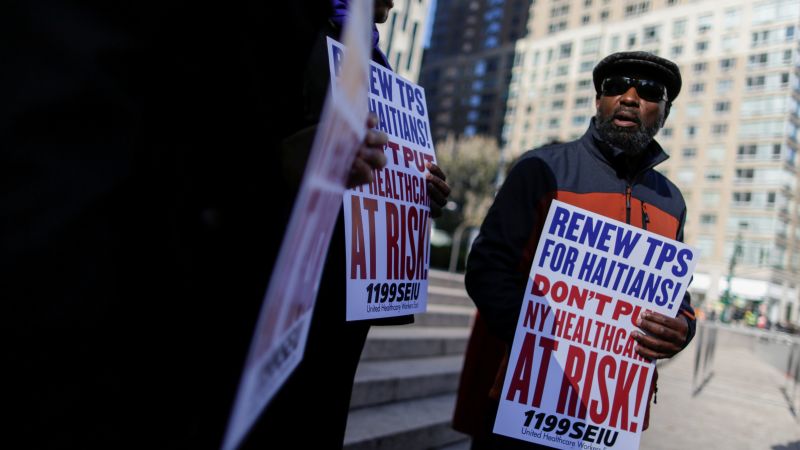In a significant legal development, a federal judge in Brooklyn has halted the Trump administration’s move to terminate temporary protected status (TPS) for Haitian migrants ahead of schedule. This ruling prevents the Department of Homeland Security (DHS) from stripping away deportation protections and work permits from over 500,000 individuals, reflecting a critical moment in the ongoing discussion surrounding immigration rights and humanitarian protections in the United States.
The decision follows an earlier action by the DHS, which operates under Secretary Kristi Noem, to rescind an 18-month extension of Haiti’s TPS designation granted by former President Joe Biden. The original TPS designation was set to remain in effect until February 3, 2026. However, the Trump administration sought to end this designation prematurely, initially proposing a new termination date of August 3, only to push it further to September 2 within subsequent weeks.
On Tuesday, U.S. District Judge Brian Cogan issued a decisive ruling indicating that Secretary Noem had violated federal law in her actions, notably neglecting to adhere to the necessary timeline and processes established by Congress. Among these procedures is the requirement for reviewing current conditions in Haiti before any termination of the TPS designation.
Judge Cogan articulated that “Secretary Noem does not have statutory or inherent authority to partially vacate a country’s TPS designation.” As a result, he declared her actions unlawful under the Administrative Procedure Act, which governs the processes federal agencies must follow in their rulemaking and enforcement activities.
Moreover, Cogan emphasized that the injuries faced by the plaintiffs in this case are both significant and urgent. He noted that these individuals cannot be compensated merely through monetary damages. Should the partial vacatur remain in force until the conclusion of the case, the plaintiffs would face the loss of their rights to live and work in the U.S., which the court has identified as the result of an unlawful action.
In light of this ruling, CNN reached out to the DHS for comments regarding the legal decision and its implications. The lawsuit, which was filed back in March, includes nine Haitian TPS holders along with advocacy organizations, such as the Haitian Evangelical Clergy Association and the Service Employees International Union (SEIU) 32BJ. The plaintiffs argued that the hasty rollback of TPS status drastically disrupted their lives, forcing families to prepare for imminent deportation far sooner than they anticipated.
Judge Cogan, who is a Bush-era appointee, stated that the plaintiffs have a solid likelihood of succeeding in their case and instructed the government to maintain Haiti’s TPS designation until at least February 2026 unless it can be lawfully terminated thereafter. However, it is important to note that this ruling does not prevent the DHS from ending the TPS designation in the future, provided that it complies with the necessary statutory requirements.
In a related legal action, another case titled Haitian Americans United Inc. v. Trump is currently progressing through the federal court system in Massachusetts, which presents similar claims surrounding TPS and its consequences for Haitian nationals living in the United States. These cases underscore a broader legal and humanitarian discourse regarding TPS holders and the protections afforded to individuals from countries facing extraordinary conditions, such as Haiti.
In summary, the ruling by Judge Cogan not only reinforces the legal framework surrounding TPS but also highlights the crucial intersection between immigration policy, individual rights, and the responsibilities of federal agencies. The ongoing litigation will continue to shape the landscape of immigration law and the rights of Haitian migrants within the U.S. for the foreseeable future.











